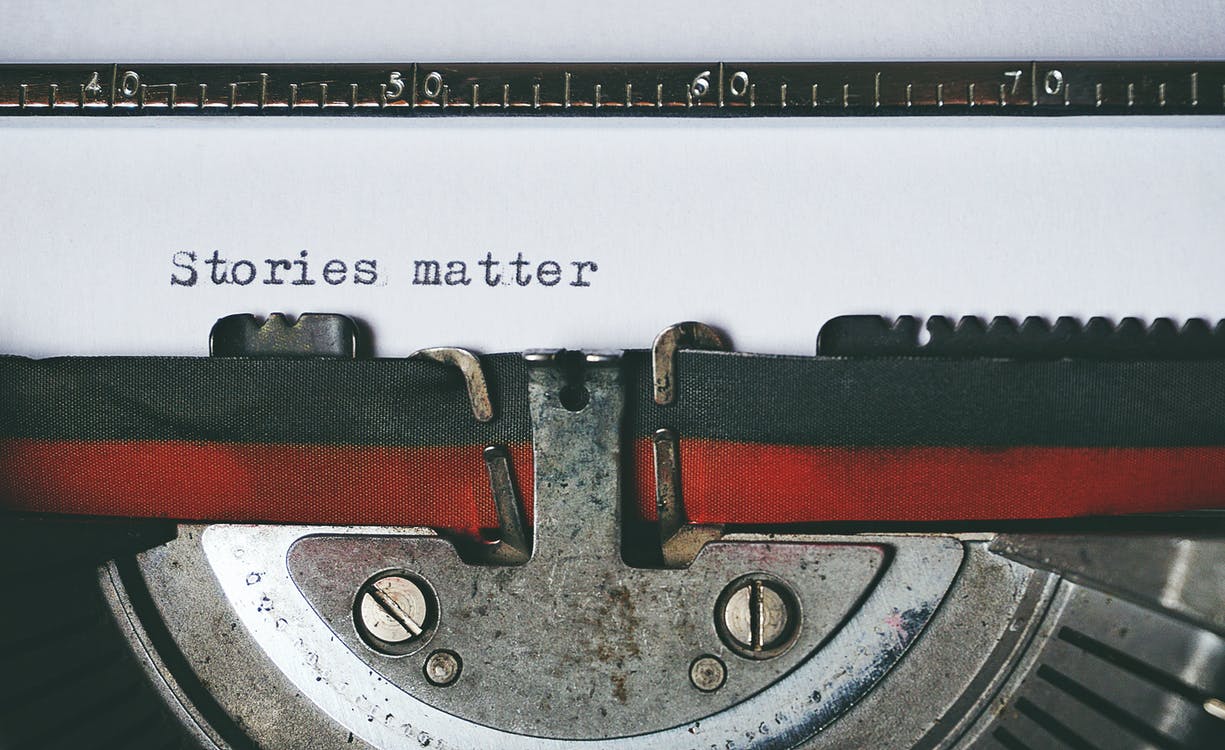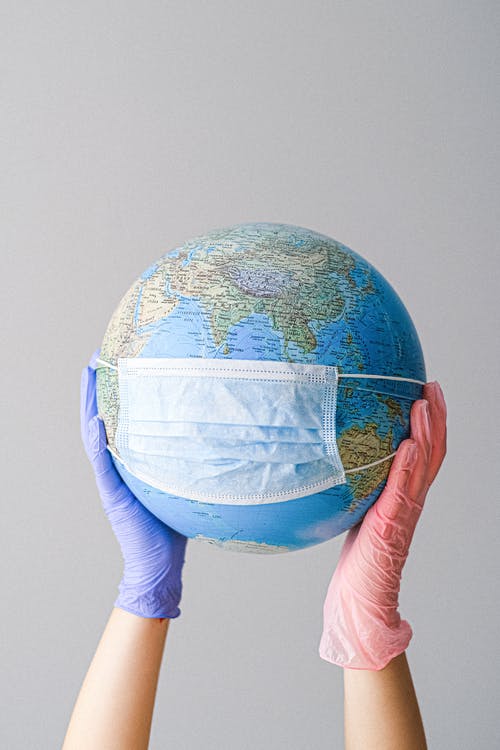Therapists Facing Masks
Life is a conversation where the objective world and the narrative world touch.

Human beings are storytellers.
From movies to books to answering the age-old question ‘how was your day?’, stories allow us to share information and experiences in ways that evoke a unique emotional connection.
When we genuinely listen to a story, we're doing more than hearing the words spoken but engaging in the art of understanding the meaning behind those words.
That experience is rarer than we think! TV is full of ‘talk shows’ with no ‘listen shows’.
Stories find life in the world through the personalities they assume when expressed. The tales and teachings help us understand the lives of others. While taking the lessons others have learned and applying their meaning to our own lives.
The story of your life plays out often when the objective world and the narrative world touch (synchronicity). In this story, it's not so much about figuring everything out as much as it’s about daily learning, meaning and being able to apply this to your life.
Meaning is, after all, an instinct that guides you through life.
How we understand stories helps us navigate relationships too. Did you know that reading fiction helps our emotional intelligence and ability to empathise with others?
Stories of research
Psychological research is a lot like a story. But beyond the tale told, research aims to fill in gaps in knowledge by answering the unknown.
Research helps challenge assumptions, bias and inform mental health policies.
Perhaps most importantly, research facilitates a story that manifests through clients' voices.
The facts are always friendly, every bit of evidence one can acquire, in any area, leads one that much closer to what is true
A story that has always interested me is characteristics that influence therapy.
Take you or me. Every part of our being is influential in some sense, with some characteristics more in our control than others.
From how we look, speak, act to our age, gender and race, our personal characteristics could unintentionally influence how we relate to others (for better or worse).
Not respecting diversity divides by differences rather than connecting through shared humanity. Interestingly, a recent ‘difference’ in therapy isn’t anything about us…but is about something on us.
Masks in therapy
Since COVID-19, increased mental health symptoms (including anxiety and depression) are seen in society. At the same time, masks became part of society and directly or indirectly connected to therapeutic relationships.
Although masks are worn as protection against COVID-19, mask-wearing impacts extend to so much more; to societal, psychological, physiological and logistical.
You could say the masks we wear hide the pain we don’t want to share with the world.
Every profound spirit needs a mask: even more, around every profound spirit is a mask continually growing
So just how do masks impact how we relate in therapy sessions?
A recent study I did asked this question (‘Therapists Facing Masks’) and I've included some excerpts below:
“Masks are a health control measure and vital strategy to limit respiratory aerosols (source control) to prevent infection (Peeples, 2020). By June 2020, an estimated 90% of the global population lived by laws requiring wearing masks in public (Howard et al., 2021). Following the COVID-19 pandemic, countries worldwide are putting evidence of masks' effects into context to comprehend the consequences of this new constraint on face recognition, where routinely encountered faces become visually obscured from human connections (Howard et al., 2021). Reading faces is a necessary skill within society to gauge the emotions of others while regulating behaviour and interactions (Freud et al., 2020). Relationships between intact facial processing and social interaction become critical in determining how masks disrupt interpretations of meaning structure. Disruptions caused by masks demand a re-evaluation of ideals in therapeutic settings to ensure traditional working methods are still achievable wearing masks.”
Discussing masks in a therapeutic setting…
“Masks within therapy are a ‘psychotherapeutic tool which is … very ancient and very new’ (Janzing, 1998. p. 156). Masks have been used therapeutically since the 1950s, integrating natural behaviour into therapy (Janzing, 1998) with diverse clinical populations, including bulimic women (Hinz & Ragsdell, 1990) and survivors of sexual abuse (Trepal-Wollenzier & Wester, 2002). As therapeutic aids, masks function as tools to engage with internal content, develop self-awareness and support self-disclosures of personal experience (Ike et al., 2020). Masks demonstrate a creative, expressive life for clients to distance themselves from problems using projective instruments to portray experience (Trepal-Wollenzier & Wester, 2002). Within therapeutic contexts, effects of masks when they are not a tool/task, but embedded in society, are unclear. Despite therapists' use of non-verbal expression to communicate meaning, the effects of mask-wearing may jeopardise relationships (Marler & Ditton, 2020). Impeded voice volume caused by masks may result in clinical errors or endanger listeners if they come closer to speakers, nullifying social distance (Pamungkasih et al., 2019), while increasing speech volume may jeopardise confidentiality and safety (Lazzarino et al., 2020).”
And conflicts between masks and our abilities to relate…

“Relational effects of masks become unclear when considering holistic conceptions of health. The World Health Organization (WHO; 2020) defines 'health' as social, psychological and physical well-being: not simply disease omission. Wearing a mask alone may not be enough to prevent COVID-19 transmission due to the nature of airborne, contact and droplet modes of transmission. More integrated systems are therefore required to account for psychosocial factors, such as mask-wearing requiring individual compliance, in addition to how governments regulate mask policy (Howard et al., 2021). Complying with healthcare and ethical guidelines, staff must adapt to new methods of connecting with patients/clients. Despite being required for safety in therapeutic encounters, one cannot be certain masks do not lead to unintended benefits or harm due to influencing the therapeutic relationship. Masks may represent an additional barrier for vulnerable individuals, including deaf, non-native language speakers or clients within therapy.”
Finally, concluding the story of therapists facing masks…
“There may be no such thing as 'being', due to the ever-changing nature of phenomenological experience, perpetually changing in a process of 'becoming'. Proposing relating as eternal, the precise moments of 'depth' appear less vital than humans' need for connection. Experience, like life, does not exist within binary domains of 'connected' or 'disconnected'. Instead, how each moment is lived and experienced gives relational moments meaning. Such profound contact appears dependent on how one relates to themselves, not a piece of material on our face calling itself a 'mask’.”
Humans as storytellers
The theme of this story emphasised the significance of mask-wearing policy in communicating masking as a social behaviour as well as a medical one. Also, that psychological interventions would benefit from being part of the public health response to addressing the psychosocial impacts of COVID-19.
Life is a conversation where the objective world and the narrative world touch.
Masked or unmasked, therapeutic relating and healing isn’t about never feeling emotions like pain, anger or sadness. But is a matter of helping people understand how they relate to it when it does arise, one word at a time.
And that story, your story, is a page-turner!
If you would like to read more, you can find the full article ‘here’

Getting started
To arrange an appointment, you can email me at andrew.kidd@firstpsychology.co.uk or contact the First Psychology Services Team on 0141 404 5411.
